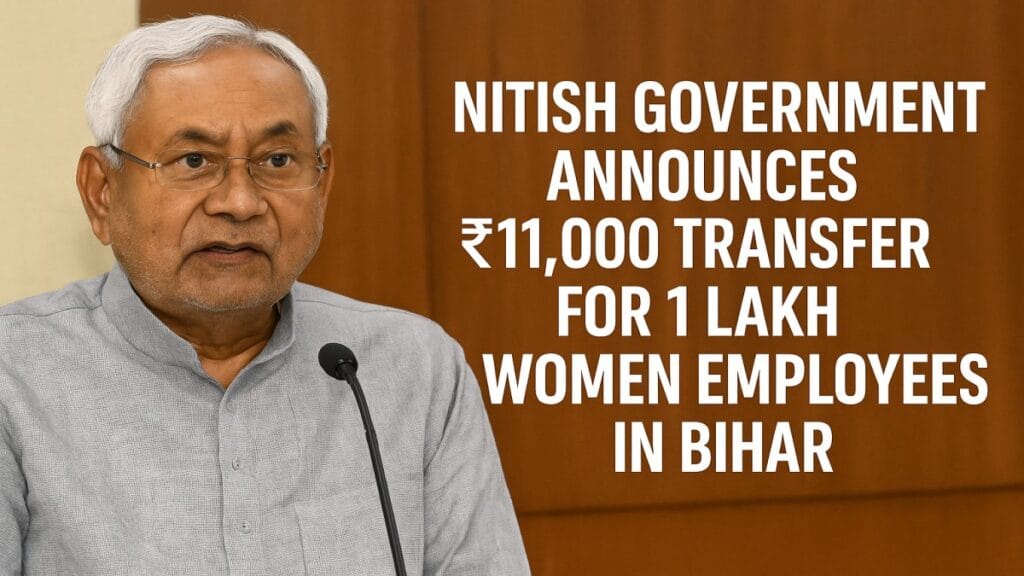
Patna, Bihar – In a significant move aimed at women empowerment and financial support, the Nitish Kumar led Bihar government has announced a direct bank transfer of ₹11,000 to the accounts of one lakh women employees across the state. The announcement was made on Tuesday during a high level cabinet meeting chaired by the Chief Minister. The scheme is part of a broader push to promote gender equity and incentivize the participation of women in government roles.
This ₹11,000 transfer scheme for women employees marks a new chapter in Bihar’s welfare strategy, especially as the state gears up for upcoming elections. With this initiative, the Nitish government aims to strengthen its image as a pro-women administration committed to social justice and economic inclusion.
What Is the ₹11,000 Transfer Scheme for Women Employees?
The Bihar government’s latest scheme will directly credit ₹11,000 into the bank accounts of one lakh female government employees, including contractual and permanent workers. The beneficiaries will span various sectors such as education, healthcare, and local administration.
According to the official statement, this one time financial assistance is being provided under a newly introduced initiative titled Mahila Samarthan Protsahan Yojana (MSPY). The primary goal of this scheme is to boost morale, offer financial security, and recognize the critical contributions of women employees in the functioning of the state government.
Objective Behind the Initiative
Addressing the media, a senior official from the Department of Women and Child Development said:
“This move is a token of appreciation for the immense contribution that women bring to the public sector. From teaching in schools to delivering healthcare in rural areas, they form the backbone of our governance machinery.”
The ₹11,000 transfer is intended not just as a financial incentive but also as a motivational gesture, highlighting the state’s commitment toward gender sensitive governance. The government believes that small yet targeted steps like these will lead to greater retention of women in the workforce and encourage more female participation in state services.
Eligibility Criteria
To qualify for the ₹11,000 transfer, women must:
- Be currently employed with the Bihar government.
- Have an active salary account linked with Aadhaar.
- Be working full time or on a contractual basis in state departments like health, education, panchayati raj, rural development, and public welfare.
The Department of Finance and Women Development is working together to compile the list of eligible candidates, with disbursements expected to begin by the second week of August 2025.
Political and Social Reactions
The announcement has been met with mixed reactions. While many women employees and unions have welcomed the ₹11,000 transfer as timely and supportive, opposition leaders have accused the Nitish government of using it as a populist tactic ahead of the 2025 state assembly elections.
Nonetheless, many civic organizations and women’s rights groups see the initiative as a positive signal, even if politically motivated. Anjali Kumari, a government school teacher in Gaya, shared her thoughts:
“We’re used to being overworked and underappreciated. Even if this is political, it feels good to be acknowledged financially. ₹11,000 can help with children’s school fees, healthcare, or savings.”
Economic Implications
The total outlay for this initiative is approximately ₹110 crore, a figure the Bihar government claims is manageable within the current fiscal space. Economists, however, have urged for long term policy planning over short term cash infusions.
Yet, with increasing attention to gender responsive budgeting, Bihar’s move could serve as a template for other Indian states. The ₹11,000 transfer scheme for women employees not only boosts their individual financial capacity but also re emphasizes the role of financial inclusion in state development policies.
A Step Toward Women Empowerment or a Political Strategy?
Whether the ₹11,000 transfer is a masterstroke of welfare politics or a strategic pre-election move, it is undeniably a boon for one lakh women across the state. The initiative recognizes their labor, contribution, and sacrifices made in the line of public service.
With rising inflation and stagnating wages in many parts of rural Bihar, even a modest direct benefit scheme like this can make a noticeable difference. The real impact, however, will depend on how the scheme is implemented, the transparency of the beneficiary selection process, and the speed of fund transfers.
Stay Connected with The News Drill for more updates.
The ₹11,000 transfer scheme for women employees in Bihar is a powerful reminder of the evolving landscape of state welfare politics. While it may be temporary, the symbolism and immediate utility of this financial incentive cannot be denied.
If implemented efficiently, this initiative may pave the way for long term women centric reforms not only in Bihar but across other Indian states. Whether driven by policy goals or political timelines, this development has once again brought the focus back on financial empowerment of women a crucial factor in India’s path to inclusive growth.
Source: First Bihar Jharkhand News Report

















